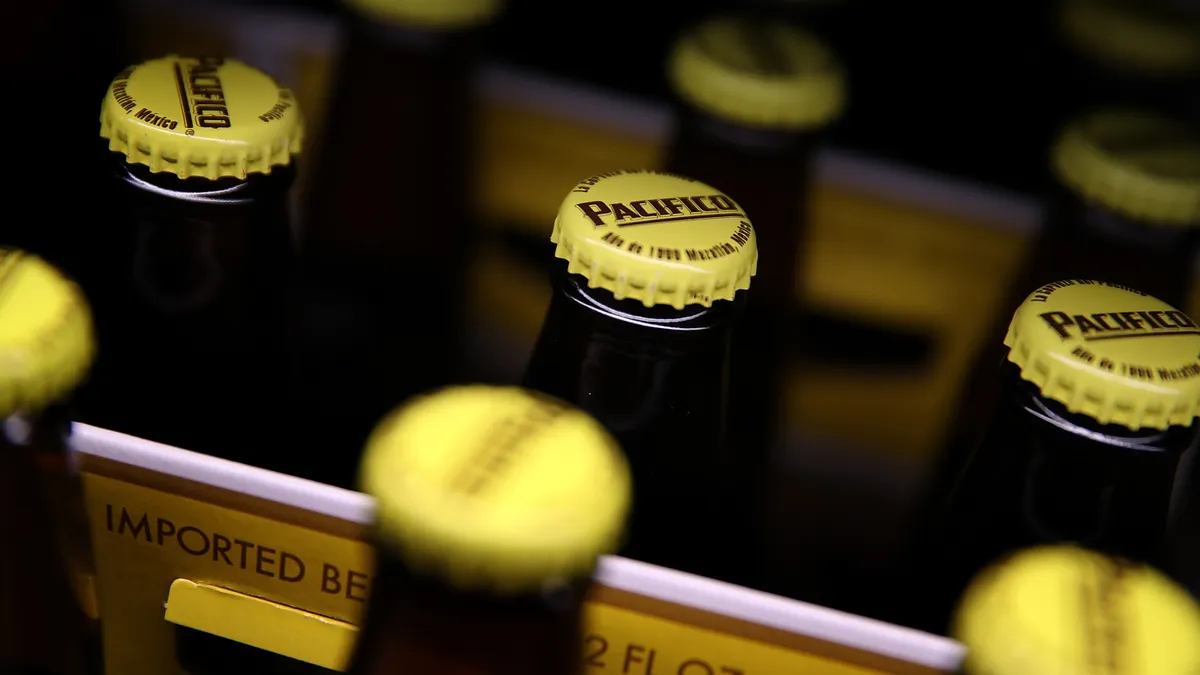Dive Brief:
- A brown glass purchasing shortage is affecting near-term growth prospects of Pacifico and other imported beers, Constellation Brands said in a Q3 earnings report.
- "We are diligently working to address the brown glass shortage that is acting as a headwind this year, especially for our Pacifico brand," CEO William Newlands said on an investor call.
- Global supply chain logistics and transportation challenges are contributing to lower product inventory levels and higher cost of product sold, according to Constellation, the third largest U.S. beer producer.
Dive Insight:
Bottles that use imported brown glass are particularly exposed to supply chain disruptions. Shipping delays, labor constraints and higher material costs affected distillers, beer makers and vintners for much of last year — and those trends have all continued.
"We are making progress on brown glass," Newlands said on the call. "It remains to be seen when we will be back to full competition and obviously it had some bearing on our ability to deliver in the quarter."
Constellation’s imported beers continue to see strong consumer demand and have a long runway for growth, Newlands said. It expects its beer business to achieve a 10% to 11% net sales increase in FY2022.
"Brown glass has been a drag against otherwise outstanding results," he said.
The problem has been ongoing. At the Morgan Stanley Global Consumer and Retail Conference last month, Newlands noted the company "left some growth on the table in things like Pacifico and Modelo Negra because we weren't able to access the amount of brown glass that we would like to have seen."
Despite the brown glass shortage, Constellation is in a better position than many thanks to its participation in a joint venture with glass container manufacturer Owens-Illinois that produces 60% of its glass bottles through partial ownership of a production plant in Mexico.
But the supply chain problems aren’t limited to Constellation’s beer business. Its wine produced in New Zealand and Italy and shipped to the U.S. for distribution has been affected by the lack of availability and increased costs of ocean freight shipping containers and port delays. The congestion has, in turn, tacked on another cost: increased storage charges, the company said in the filing.
The Mexican government forced Constellation to abandon its nearly completed $1.4 billion Mexicali Brewery project near the U.S.-Mexico border over a water dispute in 2020, the Wall Street Journal reported. After booking a loss of nearly $700 million from the halted project, the company agreed last month to build a large brewery in the Southeast Mexico state of Veracruz.
Constellation is also spending $700 million to $900 million per year from FY2023-2025 to add 15 million hectoliters of capacity to the existing 39 million at its breweries in Eagle Pass, Texas, and Sonora, Mexico. After the buildouts and the construction of the Veracruz brewery, the company will have added 25 million to 30 million hectoliters of capacity.
"In the medium-term, under normal operating conditions, we have ample capacity at the Nava and Obregon breweries to meet consumer needs based on current growth forecasts and current and planned production capabilities," Constellation said in the report.
The company also brought more of its distribution in-house, acquiring a wine and spirits distributor it had previously leased in Lodi, California in December.
It expects commodity cost inflation "in the high single-digit to low double-digit range next fiscal year," said CFO Garth Hankinson.
"We now anticipate these elevated inflationary pressures to persist well into fiscal year 2023," Hankinson said.
Correction: A previous version of this story misidentified the amount of glass produced outside the U.S.













